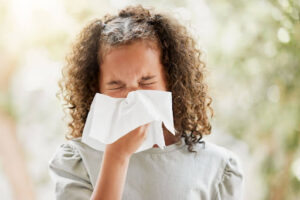
Summer is often synonymous with fun in the sun, outdoor adventures, and vacations. However, amidst all the excitement, it’s essential to remember that the warm weather also brings with it a unique set of summer illnesses.
Common Summer Illnesses
While we may associate illnesses more with the colder months, there are several common ailments that tend to peak during the summer season. HealthPark Pediatrics has outlined some of these summer illnesses and how to prevent them from putting a damper on your summertime activities.
Heat Exhaustion and Heatstroke
As temperatures soar, the risk of heat-related illnesses increases. Heat exhaustion occurs when the body overheats due to prolonged exposure to high temperatures and inadequate hydration. Symptoms include excessive sweating, dizziness, nausea, and rapid heartbeat. If left untreated, heat exhaustion can progress to heatstroke, a life-threatening condition characterized by a body temperature of 104°F (40°C) or higher, confusion, and loss of consciousness. To prevent heat-related illnesses, stay hydrated, seek shade or air-conditioned spaces, and avoid strenuous outdoor activities during the hottest parts of the day.
Sunburn
Spending long hours in the sun without adequate sun protection can lead to sunburn, characterized by red, painful skin and sometimes blistering. Sunburn not only causes discomfort but also increases the risk of skin cancer later in life. To prevent sunburn, apply sunscreen with a high SPF, wear protective clothing, sunglasses, and a wide-brimmed hat, and seek shade whenever possible.
Food Poisoning
Summer picnics, barbecues, and outdoor dining are enjoyable activities, but they can also increase the risk of foodborne illnesses. Warm temperatures facilitate the growth of bacteria in perishable foods, such as potato salad, meat, and dairy products, increasing the risk of food poisoning. To prevent foodborne summer illnesses, practice proper food handling and storage techniques, including keeping perishable foods chilled, washing hands and surfaces frequently, and avoiding cross-contamination.
Swimmer’s Ear
Spending time in the water, whether in pools, lakes, or the ocean, can lead to swimmer’s ear, a painful infection of the ear canal caused by bacteria or fungi. Symptoms include ear pain, itching, redness, and drainage from the ear. To prevent swimmer’s ear, dry your ears thoroughly after swimming, avoid inserting objects into the ear canal, and consider using earplugs while swimming in contaminated water.
Allergies
While allergies can occur year-round, certain allergens are more prevalent during the summer months. Pollen from grasses, weeds, and trees can trigger allergic reactions in susceptible individuals, leading to symptoms such as sneezing, nasal congestion, itchy eyes, and coughing. To alleviate allergy symptoms, limit outdoor activities during peak pollen times, keep windows closed and use air conditioning, and consider taking over-the-counter or prescription allergy medications.
Insect Bites and Stings
Warmer temperatures bring out a variety of insects, including mosquitoes, ticks, bees, and wasps, which can transmit diseases and cause painful bites and stings. In addition to causing itching and discomfort, insect bites can lead to allergic reactions or transmit illnesses such as Lyme disease or West Nile virus. To prevent insect bites and stings, use insect repellent, wear protective clothing, avoid areas with high insect activity, and check for ticks after spending time outdoors.
Dehydration
With increased perspiration and outdoor activities, dehydration becomes a significant concern during the summer months. Failure to replenish lost fluids can lead to dehydration, characterized by symptoms such as thirst, dry mouth, fatigue, dizziness, and dark-colored urine. To prevent dehydration, drink plenty of water throughout the day, especially when engaging in physical activity or spending time outdoors, and avoid excessive consumption of caffeinated or alcoholic beverages, which can contribute to dehydration.
Contact HealthPark Pediatrics
While summer is a time for relaxation and enjoyment, it’s essential to remain vigilant about potential health risks. If you’re looking for guidance on ways to combat summer illnesses, be sure to contact us at 919-896-7066 to make an appointment.



